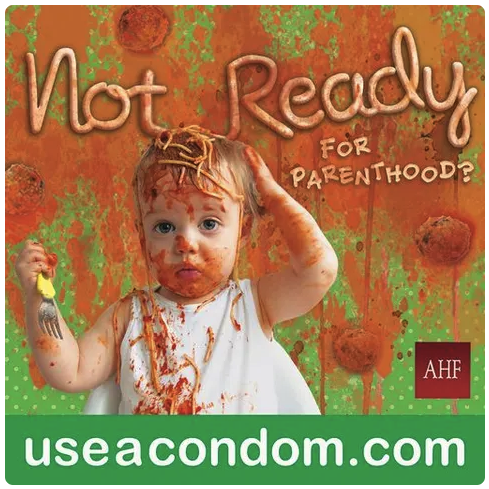Recently, while driving along a busy road in downtown Chicago, a billboard caught my eye. On the large canvas, a toddler was depicted covered in spaghetti sauce, making an unforgettable mess. As I looked upon it, I realized there was text in spaghetti noodle lettering, reading, “Not ready for parenthood? Use a Condom.” Upon initial glance, the image of the child on the billboard caused joy to swell up in my heart; however, this joy quickly turned into frustration once I realized the true purpose of this billboard: to promote contraception. Earlier this year, the AIDS Healthcare Foundation (AHF) launched this campaign to promote contraception across many major US cities. Beyond promoting the morally illicit use of contraception, AHF’s message gives rise to a plethora of additional morally corrupt ramifications.

While AHF’s advertisement certainly catches the eye and makes one think, it does so in an insincere way. A snapshot of a moment is taken and displayed on the billboard as a representation of parenthood. This is not an accurate representation, but rather a twisted version of what it looks like to have children. Although they likely would not admit it, AHF is using fear to manipulate their audience—not fear of having children, but rather, of losing one’s self. This false reality can frighten even the best of us. The fear is then multiplied when you imagine your entire self being engulfed by the experience of having a child. While it is easy to imagine the frustrating moments that require extra self-sacrifice, no parent would say that the experience of parenthood is the summation of all the frustrating moments. Rather, they would likely say the summation of the little moments of love is what makes up the experience of parenthood. It is important to recognize this and actively reject the modern view of children as a burden and not a blessing.
To reject this ad’s claim is to reject the modern view of the self. This view claims that personal enjoyment, excitement, happiness, and pleasure are the pinnacle of human existence. From this perspective, pleasure is placed on a pedestal, while all other things fall off. If something doesn’t seem to be enhancing my life, I simply avoid it. The problem with living out one’s “best life” in this sense is that it frequently opens the gates to a life of hedonism, where pleasure becomes the highest good. We categorically have a disordered life if pleasure replaces God as the highest good. While I’m sure AHF did not intend to promote hedonism, it inadvertently does so through its promotion of contraception. Hedonism is at the root of contraception. It allows the sexual union to be stripped of its procreative beauty and leaves it as a shadowed version of its true self. The focus becomes driven purely by desire rather than love. The hedonist knows nothing of sacrifice and love, and therefore, nothing of God. It tracks then that for these people, the idea of being a good and loving parent to that child covered in spaghetti seems foreign. The worldly pleasures of free time, satisfying wants and desires, and even travel would need to be sacrificed for another in this case. For the hedonist, there is no worthy cause for such sacrifice. What then occurs when hedonism slips not only into the lives of the individual but the entire culture as well?
The hedonist knows nothing of sacrifice and love, and therefore, nothing of God.
In many cases, the culture has found itself in a disordered state, placing the wrong things first. The normalization of contraception and hedonism naturally leads to a disordered view of the family. It takes little time to find numerous examples of how the view of the family has changed over the years. Presently, birth rates are plummeting, abortion and contraception have become rights rather than wrongs, and divorce rates remain high alongside a declining marriage rate. Even among Catholics, only 15% believe that contraception is morally illicit.
As a culture, we must choose a way to respond to such events. The first response is one of Judas: to fall into despair and turn even more inward than we were before. The second is of Peter: to see the hope on the horizon for new life. If we are to embrace this response of Peter, the family at its core is in desperate need of triage.
We can start triaging the family by using truth, beauty, and goodness. Through this, we may find hope in our fight against campaigns such as this. The twisted reality portrayed about children and the family must be unraveled so that the true beauty and goodness of these can be displayed. First and foremost, this begins within one’s own family. Through a good and loving marriage, God’s love is made manifest to the world. This is a steep responsibility for any married couple to live out. Yet, this gift is an everlasting one that has generational effects. Children learn how to sacrifice and love by watching their parents. This formation is what allows them to be self-sacrificial and loving to not only their future spouse but the world. Unfortunately, many did not have the luxury of having such a family. In these cases, true, beautiful, and good couples and families have the ability to show the way out of this crisis. Just as we are changed by an encounter with God, we can be changed by an encounter with a family like this. The culture needs families like this to open their doors so that others may peek into their lives and see truth, beauty, and goodness on display. This takes open and honest conversations around family life, parenthood, and married life that show both the highs and lows in an authentic way so that the true reality is revealed. It is in these moments that we can hope to soften the hedonist’s heart. Many of us often look around wondering how we can actively fight the evils of this world and find our path to sanctity. Luckily enough, the answer is likely within your own home.
